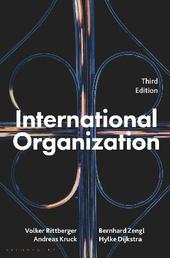
|
International Organization
Paperback / softback
Main Details
| Title |
International Organization
|
| Authors and Contributors |
By (author) Volker Rittberger
|
|
By (author) Bernhard Zangl
|
|
By (author) Andreas Kruck
|
|
By (author) Hylke Dijkstra
|
| Physical Properties |
| Format:Paperback / softback | | Pages:286 | | Dimensions(mm): Height 235,Width 155 |
|
| ISBN/Barcode |
9781137610041
|
| Classifications | Dewey:341.2 |
|---|
| Audience | | Tertiary Education (US: College) | |
|---|
| Edition |
3rd edition
|
|
Publishing Details |
| Publisher |
Bloomsbury Publishing PLC
|
| Imprint |
Bloomsbury Academic
|
| Publication Date |
22 January 2019 |
| Publication Country |
United Kingdom
|
Description
The third edition of this popular core textbook provides wide-ranging coverage of the structure, internal working, policies and performance of international organizations such as the UN, EU, IMF and World Bank. Such organizations have never been so important in addressing the challenges that face our increasingly globalised world. This book introduces students to theories with which to approach international organizations, their history, and their ability to respond to contemporary issues in world politics from nuclear disarmament, climate change and human rights protection, to trade, monetary and financial relations, and international development. Underpinning the text is the authors' unique model that views international organizations as actual organizations. Reacting to world events, political actors provide the 'inputs' which are converted by the political systems of these organizations (through various decision-making procedures) into 'outputs' that achieve varying levels of real-world impact and effectiveness. This is the perfect text for undergraduate and postgraduate students of politics and international relations taking courses on International organization and global governance, as well as essential reading for those studying the UN, the EU and Globalization. New to this Edition: - Draws on the most recent research in the field and considers some of the significant world events of the last decade to ensure that the book is completely up to date. - Two separate chapters considering Trade and Development, and Finance and Monetary Relations respectively. - Fully accounts for the challenges to international organizations by the emerging powers, the Trump administration and Brexit
Author Biography
Volker Rittberger was Emeritus Professor of Political Science and International Relations at the Institute of Political Science, University of Tubingen, Germany. Bernhard Zangl is Professor of Global Governance and Public Policy at the Ludwig Maximilian University of Munich, Germany. Andreas Kruck is an Assistant Professor in International Relations and Global Governance at the Ludwig Maximilian University of Munich, Germany. Hylke Dijkstra is Director of the MA in European Studies at Maastricht University, the Netherlands.
ReviewsThe third edition of International Organization provides a comprehensive survey of the history of international organizations (IOs) and a careful analysis of mainstream theories relevant for modern IOs. Beyond its theoretical merit, a major strength is the instrumental value of this text for explaining the policy-making process in IOs. * Houman Sadri, University of Central Florida, USA * At this critical juncture, the third edition of this highly regarded textbook elucidates the workings and impacts of international organisations across a broad a range of areas, such as security, trade, finance, development, human rights and the environment. * Ramesh Thakur, Australian National University, Australia * An outstanding textbook that presents much of the best recent research on international organizations and at the same time remains highly accessible. Comprehensive and very well structured, it will be of great help to instructors in a wide range of educational programmes. * Mathias Koenig-Archibugi, London School of Economics, UK * This third edition of International Organization is written in an accessible style, helping those who are not already experts in the field to get to grips with the subject. Compared to other books in this area, this text offers students a succinct overview of the topic and valuable references for gaining a deeper understanding of international organizations. * Wolfgang Gruber, University of Vienna, Austria * At this moment of crisis for the liberal international order, the third edition of this brilliant textbook offers an indispensable guide to how international organizations are created and maintained, how they operate and with what consequences. Written in a cogent and easily accessible style, and offering a rich array of contemporary examples, this book provides an essential and comprehensive primer for anyone wishing to learn the basics of international organization in theory and practice. * Mette Eilstrup-Sangiovanni, University of Cambridge, UK * Comprehensive and well researched, the book provides a valuable introduction to international organizations. The emphasis on the institutional aspects of international organizations is a major strength compared to other textbooks. The book presents theories in an accessible way and offers concepts and typologies that are useful in teaching. * Johan Christensen, Leiden University, the Netherlands * I have been anxious to see a new edition of this textbook. Students get not only the nuts and bolts of international organization, but also the historical setting for the creation and functioning of international institutions and the theories that help make sense of it all. The clarity of presentation, broad scope, and firm grounding in the academic literature will appeal to both newcomers and those ready to dig deeper into the subject. * David Kinsella, Portland State University, USA * This book provides an excellent overview of the literature and debates that relate to international organizations. The authors provide a clear and engaging account of the conceptual and historical foundations for different types of international organizations and address key theoretical questions on the emergence, internal decision-making, and substantive policy impact of IOs. * Zeynep Bulutgil, University College London * The updates and extensions in the third edition have made this excellent volume even more compelling as the main textbook for courses on international institutions. A must-read for students, scholars and practitioners of international organizations. * Ulrich Sedelmeier, London School of Ecnoomics, UK *
|